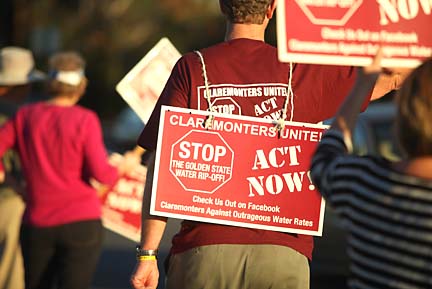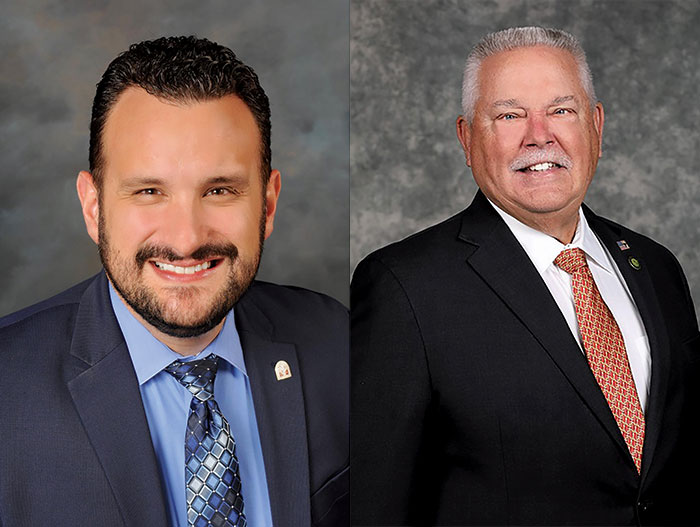Water wars are over as city drops appeal against Golden State Water

Claremont has dropped its appeal against Golden State Water Company (GSW), putting and end to their quest to take over the water system.
The decision was announced during Tuesday night’s city council meeting, which followed a closed-session meeting earlier that afternoon.
In a joint statement, both Claremont and GSW noted the settlement ends a conflict characterized as “a source of division for the past five years,” and shared a commitment to serve the city and work together in the future.
“Golden State Water Company will continue to provide the quality and reliability of water the community expects in the most professional manner,” the statement read. “Likewise, city leaders will steadfastly work to represent residents with a focus on ensuring the water service is the highest quality and the community is kept informed and involved.”
The total owed to GSW is $7,851,000, after a four percent interest rate from the original judgment of around $7.6 million handed down in March by LA County Superior Court Judge Richard Fruin.
Under the settlement deal, the city will pay GSW $2 million by the end of 2017, and will pay an annual interest payment of $234,040 each year over 12 years, with a total interest payment of $2,808,480.
The total amount paid to GSW over the next 12 years will be $4,808,480, according to the joint release. Claremont is also on the hook for its own legal fees—around $6.1 million.
The remaining $5,851,000 owed to GSW will be forgiven if the city does not draft another resolution of necessity within the 12-year period, the release says. If the city decides to do so, any paid interest is lost and the principal and accrued interest is due immediately.
A resolution of necessity is the formal decision by a government to use eminent domain to acquire a property. Agencies, like the city of Claremont, must adopt a resolution of necessity prior to bringing an eminent domain action in court.
Claremont has paid roughly $6.14 million on the trial since 2012—$1.84 million for pre-trial CEQA reviews and $4.85 million for the trial.
The settlement ends a years-long saga to claim eminent domain over the water system and place it under local control. Claremont voters, by a 72 percent margin, passed Measure W in 2014, allocating up to $135 million to pay for the water system, should the city prevail in the takeover.
Claremont had claimed throughout the eminent domain process that GSW was not transparent, was not using ground and storm water and was charging Claremonters high water rates.
The city was tasked with persuading Judge Fruin that the water system under municipal control would constitute a “more necessary use,” a vital part of an eminent domain claim. GSW has been in charge of the water system since 1929.
GSW countered, in part, by saying that simply placing the water system under local control was not enough to claim a more necessary use, and accused the city of wanting to operate the system “as is,” as opposed to making improvements.
Judge Fruin was not persuaded by the city’s claims, and ruled against Claremont on December 9, 2016 after trial the prior summer.
The Claremont city council voted unanimously in January of this year to appeal that decision. The appeal was filed February 2, 2017, with a second action filed March 21, 2017 to appeal payment of GSW’s $7.6 million in legal fees.
According to a press release provided by the city of Claremont, the city hired David Axelrad of Horvitz and Levy, “one of California’s top appellate specialists,” to look into the appeal.
“After reviewing [Judge Fruin’s] decision, Mr. Axelrad advised the city council the best possible outcome of an appeal was a partial retrial of the case,” the release stated.
At a February city council meeting, Mr. Axelrad stressed that the appeal process was not a re-hashing of the previous trial, but rather an attempt to look into any missteps made by the court. At that time, he estimated the trial review process would take two to three months because of the complexities of the case.
Mr. Axelrad also said at that meeting that it was “very unusual” the city only had a “rebuttable resumption” of a more public use of the system, which GSW successfully overcame during the trial.
“Ordinarily, the city’s adoption of the resolution of necessity would create almost a conclusive fact that there was a more appropriate public use of the utility,” he told the council. “In this particular case, the statute is specially worded to create this almost more difficult situation for a city to exercise the right to eminent domain over a public water utility.”
When reached by phone on Wednesday, Mayor Larry Schroeder said that during the review, the appellate firm determined the city had a “slim chance of success” if they went forward with the appeal.
“I think what happens is, in general in a case like that, you have a firm take a cursory look at this,” Mr. Schroeder said. “At that time we went ahead and did the paperwork for the appeal to hold our place, and then we had the law firm dig into it deeper. And as that happened, we found that there was a slim chance to prevail.”
He did not elaborate on what specifically led them to take the settlement, as he did not want to talk about what was said in closed session meetings. But he did hint that “more than likely” the city would release more details of the case later.
When reached by phone Wednesday, Mr. Axelrad deferred to City Manager Tony Ramos, who declined to comment beyond the joint statement.
During public comment, Claremont resident Jim Belna accused the city of not working in good faith with the community, and suggested creating a blue ribbon committee to review what steps the city and the city’s firm, Best, Best & Krieger, took during the case. He noted that this was “an issue of public integrity.
“One thing you can do tonight—what you should do tonight—is to resolve to waive all your attorney-client privileges and attorney work-product privileges, and make the public record completely open and transparent like it should have been all along,” he said. “The public needs to know exactly what went on here—who made your decisions, what you were told, what was said behind closed doors. All of this needs to come out.”
The council disagreed with Mr. Belna’s suggestion, maintaining that the city was transparent with residents, acted in good faith and took responsibility for what happened.
“I think we gave it everything we had and we made the best decisions we could with the information we had,” Mr. Schroeder said during Tuesday’s meeting. “And that’s all you can do. Sometimes you’re right, sometimes you’re wrong and sometimes when you get in these situations where it’s a sterile environment like court, it’s not always as easy as it would seem at first hand.”
Freeman Allen and Marilee Scaff, who have advocated for local control for years, were also present. Mr. Allen expressed regret at the outcome.
“I just want to say after the public voted in support of going ahead with the eminent domain proceedings, I’m very proud that the city council went ahead with this,” Mr. Allen said. “Of course I’m terribly disappointed that we didn’t prevail, but I do hope that our relationships with Golden State Water will be positive from here on out, and they pay more attention to the wishes of Claremont residents.”
Ms. Scaff, who wrote the League of Women Voters directive spearheading the quest to take over the water system, was similarly disappointed. She said she regretted the outcome of the case—“more than you can know”—but believes the settlement was fair.
“We simply have to admit that we have lost this case and that’s the way it is,” she said. “Losing the case is expensive; we knew that from the first. I was very proud of the people of Claremont, voting that they were willing to spend money to have this happen. I think they were correct. Sometimes the courts don’t rule in the way you think they should.”
—Matthew Bramlett
news@claremont-courier.com








0 Comments